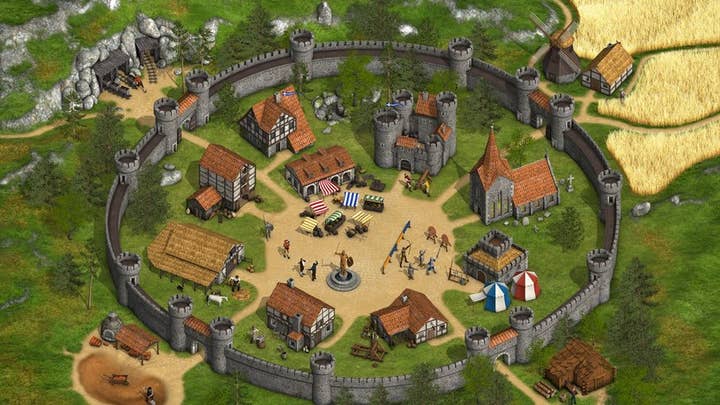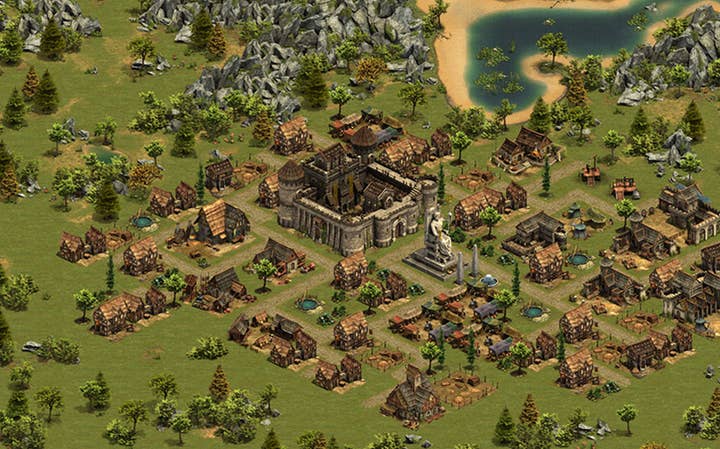InnoGames: "Spreading risk also means you're spreading your energy"
Ahead of his talk at Devcom, CEO Hendrik Klindworth reflects on how a focused portfolio aided the transition from browser to mobile
When I last visited InnoGames in 2011, the German industry was in a boom period. The Hamburg-based studio was just about to release a promising new title called Forge of Empires, one that went on to be its greatest success.
The other German companies I visited that year - including Gamigo, Bigpoint and Goodgame Studios - had also found success in the still robust browser market, and were looking toward a future that would bring plenty more. It didn't work out for all of them, but it did for InnoGames.
This year, the Modern Times Group upped its stake in the company to 51%, recognition of InnoGames' track record for sustaining hit games and growing revenue year after year. At Devcom in Cologne next week, CEO Hendrik Klindworth will detail the role the company's transition to mobile played in that story of success.
"Not only the success," he adds, "but also the challenges along the way."
In 2011, you were very much focused on the browser. At that time, there were some really successful German companies in that space: Bigpoint, Goodgame Studios, Gamigo; it was a vibrant period for the German games industry, but InnoGames is the one that has really gone from strength to strength.
"In 2011 it was a time when it really seemed like there was unlimited growth"
Klindworth: In 2011, it was a time when it really seemed like there was unlimited growth. Growth was very easy still, but 2011 was also the time when it started to get much more competitive. User acquisition went through the roof, markets got more challenging, but this was a time when - especially on a relative level - things for InnoGames were getting better and better.
The harder the market got, the better it worked for us. Really making sure we had good analytics in place, good marketing, and also being efficient in all of our activities when we scaled a game. It worked very well for us when the market was getting hotter and more competitive.
At this time we managed to really outgrow some of our competitors. But I think one aspect that was always very important for us - and is still important - is that we didn't want to grow too much in terms of company size, employees and people. It becomes too hard to keep a consistent culture and find the right processes when you grow too fast.
Some of your competitors took a different strategy, growing very big relatively quickly. You wanted to take a more measured approach then?
Klindworth: When things are running very well the best idea seems to be to hire more people and do more of everything, but it is especially important to stay true to your growth strategy in those times. Be careful not to over-spend, over-hire; in hindsight that was really important for us.
Also, we focused on hiring the right people. It wasn't about the mass of people, it was really about the quality.

When I visited InnoGames had around 200 people. How many are you now?
Klindworth: Around 420.
Given how successful InnoGames has been, doubling headcount in six years is fairly conservative. One of the main contributors to that success is Forge of Empires, the browser version of which was about to launch in 2011, and reached €250 million lifetime revenue in May this year.
Klindworth: It's been on the market for a few years already, and it's still growing. It was very helpful to have the mobile version out there, which started a new growth phase for Forge of Empires.
It's also been a couple of years since we went full-force into mobile, and we can continue to grow player base and revenues. It's really nice to see, and also a strength of InnoGames; that we are able to run games for many, many years. Our very first game, Tribal Wars, is 14 years old and still active.
Not every company I talked to in 2011 has been so prosperous. The temptation is to put it down to InnoGames handling the transition to mobile better than the others. Is it that simple?
"It's not really about a mass of games. It doesn't help if you have 12 mediocre games"
Klindworth: I would say that, in the end, it worked out, but it was a lot of hard work for us... Our real breakthrough was Forge of Empires [on mobile] in 2014. There was at least three years where we had to make sure the whole company was focused on mobile, and not everything went perfectly immediately. Sometimes we had to re-try things, but that helped us.
We learned from that experience, tried a new approach, and then the real breakthrough was 2014 with the tablet version of Forge of Empires. That was the first time we thought, 'finally, now all of the hard work pays off. Mobile really works.'
What part does browser play for InnoGames today? Will every new product be mobile from now on?
Klindworth: As a company, we still continue to grow our browser revenues, which is quite nice to see. The growth is not as big as mobile, of course, so we focus our new games on mobile-only. That's where we see the future growth of the company, even though we continue to run our browser games.
You're on more platforms now, but you still have quite a lean portfolio. It's bigger than it was in 2011, but not dramatically so.
Klindworth: That's important. There is the temptation to do many things at the same time. As a company - even as a 400-person company - you have to focus your energy on your making really great games. Then when you have a couple of successful games you can focus on making this super successful, you can develop your players there. It's not really about a mass of games. It doesn't help if you have 12 mediocre games.
Nowadays this is relevant for all companies. You have strong games, you invest more in these strong games, and everything gets better iteration by iteration.

Is there anything to be said for a larger portfolio, and spreading risk across more games?
Klindworth: Spreading risk also means you're spreading your energy. Any company has a limited amount of resources, a limited amount of energy that you can use to be successful. That's why you have to focus.
You earned €130 million revenue in 2016, 25% higher than the year before. Have there been many down years?
"Any company has a limited amount of energy you can use to be successful. That's why you have to focus"
Klindworth: Every year until now [has been higher than the last]. It's what we've achieved in the past, and it's what we hope will follow in the future.
When you think about growing in the future, how important is global expansion? Are you looking beyond Europe and the US, to Asia and South America?
Klindworth: South America is a relevant market for us, and a growing market. But we decided against further activities in Korea. The player expectations there are quite different to what you see in the US and Europe. Different kinds of games are successful there; the local developers are very strong and really understand the market. Our focus is on Western markets, and not so much South Korea, China or Japan.
You're now focused on the mobile market, which is widely seen as becoming more volatile all the time.
Klindworth: But with the experience we've gathered, we also gain the ability to predict what will happen over the next months and years to come. When we build an experience we know what's going on behind it; we know how to do the marketing, the investments, how to grow our player base. For us, especially when a game is out there and live, it's really a predictable part of our business.
New games? It's always interesting to see how they work out. They're more of a challenge.
How many new games can you release in a year and still retain the focus that has proved so valuable?
Klindworth: A few launches per year. That's the upper limit of what we can achieve. Even two or three games is a big challenge, and we will always focus on quality.
GamesIndustry.biz is an official media partner for Devcom. The organisers are paying for our travel and accommodation.





.jpg?width=291&height=164&fit=crop&quality=80&format=jpg&auto=webp)


